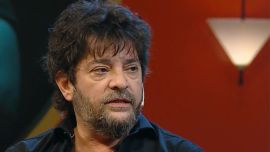Argentina’s smallest province not beginning with the letter “T” (Tierra del Fuego and Tucumán), even if the size of Belgium, Misiones nevertheless ranks among the Top 10 in demographic terms and third for density of population – statistics at all odds with its jungle image (as enshrined by Horacio Quiroga’s Cuentos de la selva). An image of pure nature painted in green, red and blue – the intense green of virgin jungle (still over a third of the province), tea hills and yerba plantations alike, the famous red clay of its fertile soil and the deep blue of its subtropical skies with toucans and parrots flying overhead. The spectacular Iguazú Falls (which no tourist here should miss, especially in the next few months with more moderate temperatures) are justifiably famous as one of the three great waterfalls of the world but it should be stressed that it is the lush verdant setting bright with orchids which makes them unique rather than the sheer volume of water (inferior to Niagara).
The falls far from exhaust the tourist delights of Misiones – the striking ruins of the 17th century Jesuit mission at San Ignacio Mini (the work of thousands of Guaraní converts since there were never more than four Jesuits at a time), the fishing paradise of Eldorado, the gems of Wanda, among others – but this is a political column, not a travel brochure, and we will stay with the people of Misiones rather than its sights from here on.
The provincial elections on June 2 will be contested by six lists, including three minor provincial groupings. The prevailing nationwide polarisation is blurred here by the presence of Peronists in all three main lists – Cambiemos (now renamed Juntos por el Cambio), the Renewal Front for Social Concord (based on the ruling party since 2003) and the Agrarian and Social Front (PAyS in its Spanish acronym from its main party). Cambiemos also includes the moderate Peronists backing the 1991- 1999 governor Ramón Puerta (firmly identified with Carlos Menem’s neo-conservatism and now President Mauricio Macri’s ambassador in Spain), the Renewal Front was strongly aligned with Kirchnerism during its dozen years in national power and PAyS now proposes to appeal to Kirchnerism by offering a more uncompromising opposition to Macri than the current provincial government.
Current Governor Hugo Passalacqua (a Radical throughout the 20th century who since became Kirchnerite) cannot run since he was previously lieutenant-governor to 2007-2015 governor Maurice Closs. Passalacqua’s heir-apparent is his Lieutenant-Governor Oscar “Turco” Herrera Ahuad, who must fancy his chances, given the huge incumbent advantages in provincial voting so far, although some opinion polls (against all national trends) favour Cambiemos Senator Humberto Schiavoni, a PRO heavyweight who has chaired the party’s National Council since 2012. But neither candidate is absolutely installed – Closs contemplates a comeback from his current Senate seat while the candidacy of Pedro Puerta (the ex-governor’s son) is favoured by some in Cambiemos as offering a Peronist wing to broaden appeal. Indeed, provincial deputy Isaac Lenguaza for PAyS is the only clearly defined gubernatorial candidate so far.
As for national Congress voting, the three senators (Schiavoni and Closs with Magdalena Solari Quintana filling the third seat for the ruling provincial party) are not up until the next general elections in 2023 so need little attention here. But four of the seven Misiones deputies will be vacating their seats in October – María Cristina Britez of the Victory Front, Verónica Derna, Daniel Di Stefano (31, the youngest deputy until 2017) and Jorge Franco for the Misiones Concord Front with Flavia Morales and Ricardo Wellbach (Misiones Concord Front) and Luis Pastori (Radical) staying on a further two years. While odd numbers of seats give one side the advantage by definition, even numbers usually guarantee an equal split but if the ruling provincial party (which now controls five of the seven deputies) could sweep three of the four seats in 2015, they could presumably repeat that feat now.
In presidential voting, Misiones joined Radical Raúl Alfonsín upon the return to democracy in 1983 but has voted Peronist ever since (even being one of just four provinces to vote for Eduardo Duhalde in 1999). In 2015 it was one of only three provinces to give over 60 percent of its vote to Peronist Daniel Scioli (61 percent in the first round, which slipped to 58 percent in the run-off, however). Unlikely to offer much leverage for Macri’s re-election.
This is a series on Argentine provinces and therefore for the purposes of this column, Misiones history – with all due respect for Guaraní civilisation (almost as advanced as the Aztecs and Incas) and the Jesuit missions (which give their name to the province, of course) – does not begin until 1870 when it was permanently removed from Paraguayan hands. The provincial capital of Posadas did not even exist until then while the national territory of Misiones did not come into being until 1882. Until elevation to provincial status as from 1953 there were 38 territorial governors (all appointed from Buenos Aires) while between 1955 and 1983 trustees outnumbered elected governors by 19 to six (two of whom perished when their aeroplane was blown up by the Triple A right-wing Peronist terrorist organisation in 1973). Alfonsín’s upset national win in 1983 was reflected locally by a Radical governor (Ricardo Barrios Arrechea) but the Radical midterm meltdown of 1987 (only two provinces retained) was followed by first Peronists – Julio César Humada, Puerta and Carlos Roviría, whose 2006 bid to secure infinite re-election beyond his two terms via a single-clause constitutional reform suffered a referendum fiasco despite Kirchnerite support – and then the current Renewal Front for Social Concord (created by Roviría in 2003 after he lost control of the Justicialist Party to Puerta).
Misiones is the first province in this series with a population already reaching seven digits in the 2010 census – 1,101,593 to be exact (almost 80 percent urban although often rurally employed). Of these 275,028 were registered in Posadas – far from being the province’s biggest tourist attraction. The second city is Oberá (63,310 in the 2010 census) – famous for its immigrant festivals with some 15 different communities including such often blond peoples as Scandinavians (with many Finns), Germans, Poles and Ukrainians – closely followed by Eldorado (60,521). The only other cities with over 30,000 in the 17 departments are the Posadas satellite of Garupá (44,441) and Puerto Iguazú (41,062) which services waterfalls tourism.
Talking of Iguazú, with more people coming to admire the falls each year (1.3 million) than inhabit the province, Misiones is always going to give more importance to tourism than to politics.
#15 Misiones
Electorate (2017): 894,679
Governor: Hugo Passalacqua (Social Concord)
Senators: Three (2 Social Concord, 1 Cambiemos/PRO)
Deputies: Seven (5 Misiones Concord Front, 1 Victory Front, 1 Radical)
On the ballot: Four of seven deputies























Comments